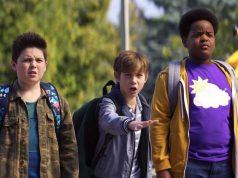Alex Garland’s first novel, “The Beach” was turned into a movie by director Danny Boyle, who went on to direct two of Garland’s screenplays, “28 Days Later” and “Sunshine.” Garland strengthened his sci-fi bonafides with solid screenplay adaptations of “Never Let Me Go” and “Dredd,” and has now graduated to directing his own original work — “Ex Machina,” a wry, ponderous story of artificial intelligence, natural intelligence, and good old-fashioned hubris.
Caleb (Domhnall Gleeson), a coder at a Google-like company called Bluebook, wins an employee lottery to spend a week with CEO Nathan Bateman (Oscar Isaac), an eccentric billionaire genius who lives in a remote, high-tech house on a mountain estate, the better to conduct his mind-blowing experiments without scrutiny. Nathan is disheveled, frequently drunk, gregarious, but secretive. He tells Caleb that what he needs him to do is conduct a Turing test on an A.I. device he built. He needs to know if this computer is smart enough to make people think it’s a person.
It’s certainly beautiful enough. The computer is in the form of Ava (Alicia Vikander), a sexy robot with a model’s face, visible mechanical guts, and mesh skin. She looks remarkably human, and she converses with Caleb so intelligently that it’s hard to believe she’s not self-aware. Or maybe she is: when she has a moment alone with Caleb, she tells him not to trust Nathan.
Creations rebelling against their creators? Now we’re talking.
Garland is tackling familiar themes here, using tropes common to the A.I. genre. The film is smart but not brainy — it isn’t dumbed-down, but it’s unlikely to inspire any thoughts you haven’t had before, either.
What makes it work as an above-average drama are the charismatic performances and the dynamics between the three central figures. Oscar Isaac is tragic, often comically so, as the man who wants to be a god; Domhnall Gleeson provides the viewpoint of a non-crazy person; and Alicia Vikander is somehow both alluringly warm and robotically chilly.
Caleb, a decent man with moral quandaries, is sexually attracted to Ava, and she seems to have interest in him too. Is this by design? Is his affection reciprocated? CAN it be reciprocated? He wants to know what Nathan is hiding in the parts of the house he doesn’t have access to, and he wants to know more about Kyoko (Sonoya Mizuno), the silent maid who supposedly doesn’t speak English and waits on Nathan hand and food. He wants to know why Ava doesn’t trust Nathan. But he isn’t entirely sure HE can trust AVA, either. The story becomes a web of people (and sexy robots) carefully choosing what to say and what not to say to one another. As storyteller, Garland doesn’t give us any more information than Caleb has, keeping us guessing what’s going to happen next.
Those guesses will sometimes be accurate. Whether or not you’ve seen other movies about scientists who create machines that are smarter than they are, it isn’t hard to imagine the possible outcomes. Furthermore, there are only so many different permutations of a three-person scenario, especially when one of the persons is a machine.
That being said, “Ex Machina” is far less predictable — and much better shot (by cinematographer Rob Hardy) — than its threadbare plot summary might make it sound. It only drags near the end, when all has been revealed and we’re waiting for the wrapping up. And even then, it never stops being slick, cool, and polished, its intelligence not artificial at all.
B (1 hr., 48 min.; )
Originally published at Movie Mezzanine.





